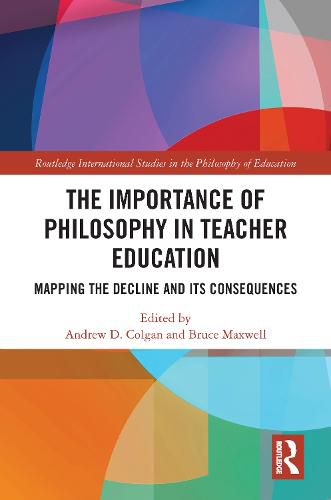Readings Newsletter
Become a Readings Member to make your shopping experience even easier.
Sign in or sign up for free!
You’re not far away from qualifying for FREE standard shipping within Australia
You’ve qualified for FREE standard shipping within Australia
The cart is loading…






The Importance of Philosophy in Teacher Education maps the gradual decline of philosophy as a central, integrated part of educational studies. Chapters consider how this decline has impacted teacher education and practice, offering new directions for the reintegration of philosophical thinking in teacher preparation and development.
Touching on key points in history, this valuable collection of chapters accurately appraises the global decline of philosophy of education in teacher education programs and seeks to understand the external and endemic causes of changed attitudes towards a discipline which was once assigned such a central place in teacher education. Chapters illustrate how a grounding in the theoretical and ethical dimensions of teaching, learning, and education systems contribute in meaningful ways to being a good teacher, and trace the consequences of a decline in philosophy on individuals’ professional development and on the evolution of the teaching profession more broadly. With this in mind, the text focusses on the future of teacher education and considers how we can ensure that philosophy of education feeds into the excellence of teaching today.
This book will be of great interest to graduate, postgraduate students as well as research scholars in the field of educational philosophy and history of education. In addition, it will be useful for those involved in teacher education, and in particular, course, module and program development.
$9.00 standard shipping within Australia
FREE standard shipping within Australia for orders over $100.00
Express & International shipping calculated at checkout
The Importance of Philosophy in Teacher Education maps the gradual decline of philosophy as a central, integrated part of educational studies. Chapters consider how this decline has impacted teacher education and practice, offering new directions for the reintegration of philosophical thinking in teacher preparation and development.
Touching on key points in history, this valuable collection of chapters accurately appraises the global decline of philosophy of education in teacher education programs and seeks to understand the external and endemic causes of changed attitudes towards a discipline which was once assigned such a central place in teacher education. Chapters illustrate how a grounding in the theoretical and ethical dimensions of teaching, learning, and education systems contribute in meaningful ways to being a good teacher, and trace the consequences of a decline in philosophy on individuals’ professional development and on the evolution of the teaching profession more broadly. With this in mind, the text focusses on the future of teacher education and considers how we can ensure that philosophy of education feeds into the excellence of teaching today.
This book will be of great interest to graduate, postgraduate students as well as research scholars in the field of educational philosophy and history of education. In addition, it will be useful for those involved in teacher education, and in particular, course, module and program development.